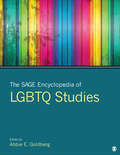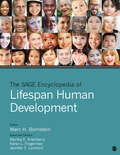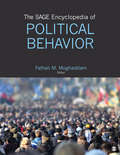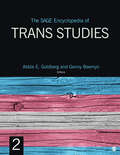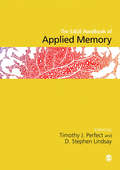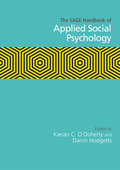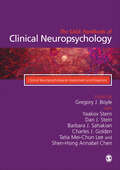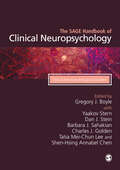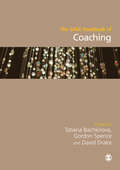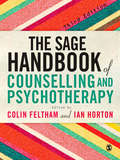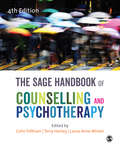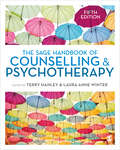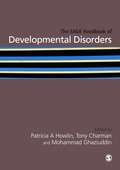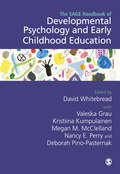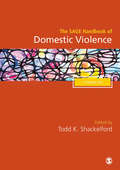- Table View
- List View
The SAGE Encyclopedia of LGBTQ Studies
by Abbie E. GoldbergThis far-reaching and contemporary new Encyclopedia examines and explores the lives and experiences of Lesbian, Gay, Bisexual, Transgender and Queer (LGBTQ) individuals, focusing on the contexts and forces that shape their lives. The work focuses on LGBTQ issues and identity primarily through the lenses of psychology, human development and sociology, emphasizing queer, feminist and ecological perspectives on the topic, and addresses questions such as: · What are the key theories used to understand variations in sexual orientation and gender identity? · How do Gay-Straight Alliances (GSA) affect LGBTQ youth? · How do LGBTQ people experience the transition to parenthood? · How does sexual orientation intersect with other key social locations, such as race, to shape experience and identity? · What are the effects of marriage equality on sexual minority individuals and couples? Top researchers and clinicians contribute to the 400 signed entries, from fields such as: · Psychology · Human Development · Gender/Queer Studies · Sexuality Studies · Social Work · Sociology The SAGE Encyclopedia of LGBTQ Studies is an essential resource for researchers interested in an interdisciplinary perspective on LGBTQ lives and issues.
The SAGE Encyclopedia of Lifespan Human Development
by Marc H. BornsteinLifespan human development is the study of all aspects of biological, physical, cognitive, socioemotional, and contextual development from conception to the end of life. In approximately 800 signed articles by experts from a wide diversity of fields, The SAGE Encyclopedia of Lifespan Human Development explores all individual and situational factors related to human development across the lifespan. Some of the broad thematic areas will include: Adolescence and Emerging Adulthood Aging Behavioral and Developmental Disorders Cognitive Development Community and Culture Early and Middle Childhood Education through the Lifespan Genetics and Biology Gender and Sexuality Life Events Mental Health through the Lifespan Research Methods in Lifespan Development Speech and Language Across the Lifespan Theories and Models of Development. This five-volume encyclopedia promises to be an authoritative, discipline-defining work for students and researchers seeking to become familiar with various approaches, theories, and empirical findings about human development broadly construed, as well as past and current research.
The SAGE Encyclopedia of Lifespan Human Development
by Marc H. BornsteinLifespan human development is the study of all aspects of biological, physical, cognitive, socioemotional, and contextual development from conception to the end of life. In approximately 800 signed articles by experts from a wide diversity of fields, The SAGE Encyclopedia of Lifespan Human Development explores all individual and situational factors related to human development across the lifespan. Some of the broad thematic areas will include: Adolescence and Emerging Adulthood Aging Behavioral and Developmental Disorders Cognitive Development Community and Culture Early and Middle Childhood Education through the Lifespan Genetics and Biology Gender and Sexuality Life Events Mental Health through the Lifespan Research Methods in Lifespan Development Speech and Language Across the Lifespan Theories and Models of Development. This five-volume encyclopedia promises to be an authoritative, discipline-defining work for students and researchers seeking to become familiar with various approaches, theories, and empirical findings about human development broadly construed, as well as past and current research.
The SAGE Encyclopedia of Political Behavior
by Fathali M. MoghaddamThe SAGE Encyclopedia of Political Behavior explores the intersection of psychology, political science, sociology, communications, and human behavior to better understand why and how people interact with political processes. Bringing together scholars from around the world, the encyclopedia integrates theories, research, and case studies from a variety of disciplines to help readers better understand the complexities of political behavior. Contributors analyze the forces that shape the behavior of individuals, groups, and social movements and how that behavior impacts political outcomes and public policy debates. In over 360 entries, the encyclopedia focuses broadly on the following topics: Cognitive processes Group identities and influence Individual political behavior International/comparative perspectives Justice and political behavior Media, discourse, and communications Policies and political behavior Political systems Security and terrorism Social political movements Theories of political behavior Voting behavior and political campaigns Aimed at college and university students, this one-of-a-kind reference covers voting patterns, interactions between groups, what makes different types of government systems appealing to different societies, and the impact of early childhood development on political beliefs, among others. Topics explored by political psychologists are of great interest in fields beyond either psychology or political science, with implications, for instance, within business and management. This title will be available online on SAGE Knowledge, the ultimate social sciences library.
The SAGE Encyclopedia of Political Behavior
by Fathali M. MoghaddamThe SAGE Encyclopedia of Political Behavior explores the intersection of psychology, political science, sociology, communications, and human behavior to better understand why and how people interact with political processes. Bringing together scholars from around the world, the encyclopedia integrates theories, research, and case studies from a variety of disciplines to help readers better understand the complexities of political behavior. Contributors analyze the forces that shape the behavior of individuals, groups, and social movements and how that behavior impacts political outcomes and public policy debates. In over 360 entries, the encyclopedia focuses broadly on the following topics: Cognitive processes Group identities and influence Individual political behavior International/comparative perspectives Justice and political behavior Media, discourse, and communications Policies and political behavior Political systems Security and terrorism Social political movements Theories of political behavior Voting behavior and political campaigns Aimed at college and university students, this one-of-a-kind reference covers voting patterns, interactions between groups, what makes different types of government systems appealing to different societies, and the impact of early childhood development on political beliefs, among others. Topics explored by political psychologists are of great interest in fields beyond either psychology or political science, with implications, for instance, within business and management. This title will be available online on SAGE Knowledge, the ultimate social sciences library.
The SAGE Encyclopedia of Trans Studies
by Abbie E. Goldberg Genny BeemynTransgender studies, broadly defined, has become increasingly prominent as a field of study over the past several decades, particularly in the last ten years. The experiences and rights of trans people have also increasingly become the subject of news coverage, such as the ability of trans people to access restrooms, their participation in the military, the issuing of driver’s licenses that allow a third gender option, the growing visibility of nonbinary trans teens, the denial of gender-affirming health care to trans youth, and the media’s misgendering of trans actors. With more and more trans people being open about their gender identities, doctors, nurses, psychologists, social workers, counselors, educators, higher education administrators, student affairs personnel, and others are increasingly working with trans individuals who are out. But many professionals have little formal training or awareness of the life experiences and needs of the trans population. This can seriously interfere with open communications between trans people and service providers and can negatively impact trans people’s health outcomes and well-being, as well as interfere with their educational and career success and advancement. Having an authoritative, academic resource like The SAGE Encyclopedia of Trans Studies can go a long way toward correcting misconceptions and providing information that is otherwise not readily available. This encyclopedia, featuring more than 300 well-researched articles, takes an interdisciplinary and intersectional approach to trans studies. Entries address a wide range of topics, from broad concepts (e.g., the criminal justice system, activism, mental health), to specific subjects (e.g., the trans pride flag, the Informed Consent Model, voice therapy), to key historical figures, events, and organizations (e.g., Lili Elbe, the Stonewall Riots, Black Lives Matter). Entries focus on diverse lives, identities, and contexts, including the experiences of trans people in different racial, religious, and sexual communities in the United States and the variety of ways that gender is expressed in other countries. Among the fields of studies covered are psychology, sociology, history, family studies, K-12 and higher education, law/political science, medicine, economics, literature, popular culture, the media, and sports.
The SAGE Encyclopedia of Trans Studies
by Abbie E. Goldberg Genny BeemynTransgender studies, broadly defined, has become increasingly prominent as a field of study over the past several decades, particularly in the last ten years. The experiences and rights of trans people have also increasingly become the subject of news coverage, such as the ability of trans people to access restrooms, their participation in the military, the issuing of driver’s licenses that allow a third gender option, the growing visibility of nonbinary trans teens, the denial of gender-affirming health care to trans youth, and the media’s misgendering of trans actors. With more and more trans people being open about their gender identities, doctors, nurses, psychologists, social workers, counselors, educators, higher education administrators, student affairs personnel, and others are increasingly working with trans individuals who are out. But many professionals have little formal training or awareness of the life experiences and needs of the trans population. This can seriously interfere with open communications between trans people and service providers and can negatively impact trans people’s health outcomes and well-being, as well as interfere with their educational and career success and advancement. Having an authoritative, academic resource like The SAGE Encyclopedia of Trans Studies can go a long way toward correcting misconceptions and providing information that is otherwise not readily available. This encyclopedia, featuring more than 300 well-researched articles, takes an interdisciplinary and intersectional approach to trans studies. Entries address a wide range of topics, from broad concepts (e.g., the criminal justice system, activism, mental health), to specific subjects (e.g., the trans pride flag, the Informed Consent Model, voice therapy), to key historical figures, events, and organizations (e.g., Lili Elbe, the Stonewall Riots, Black Lives Matter). Entries focus on diverse lives, identities, and contexts, including the experiences of trans people in different racial, religious, and sexual communities in the United States and the variety of ways that gender is expressed in other countries. Among the fields of studies covered are psychology, sociology, history, family studies, K-12 and higher education, law/political science, medicine, economics, literature, popular culture, the media, and sports.
The SAGE Handbook of Applied Memory
by D Stephen Lindsay Timothy J Perfect"A fabulous collection of essays on memory in the real world. The leading scholars have been assembled to produce a volume that is intellectually rich, up-to-date, and truly important." - Elizabeth F. Loftus, Distinguished Professor, University of California, Irvine "An invaluable resource for anyone wishing to access the current state of knowledge of, or contemplating research into, the growing area of applied memory research." - Graham Davies, Editor, Applied Cognitive Psychology The SAGE Handbook of Applied Memory is the first of its kind to focus specifically on this vibrant and progressive field. It offers a broad and comprehensive coverage of recent theoretical and empirical research advances in the psychology of memory as they apply to a range of applied issues, and offers advanced students and researchers the opportunity to survey the literature in the psychology of memory across a range of applied domains. Arranged into four sections: Everyday Memory; Social and Individual Differences in Memory; Subjective Experience of Memory; and Eyewitness Memory, this handbook provides a comprehensive summary and evaluation of scientific memory research as well as theory in a broad range of applied topics including those in cognitive, forensic and experimental psychology. Brought together by world-leading scholars from across the globe, The SAGE Handbook of Applied Memory will be of great interest to all advanced students and academics with an interest in all aspects of applied memory.
The SAGE Handbook of Applied Social Psychology
by Darrin Hodgetts Kieran C. O'DohertyIn the present epoch of global change, movement, interconnection and the intensification of social issues within and across many societies, applied social psychology is more relevant than ever. The SAGE Handbook of Applied Social Psychology offers an overview of the field and the disparate and evolving approaches. Through an international team of contributors, the handbook brings prominent research literature together and organises it around ten key areas: Part 01: Culture, race, indigeneity Part 02: Gender & Sexuality Part 03: Politics Part 04: Health and mental health Part 05: Work Part 06: Ageing Part 07: Communication Part 08: Education Part 09: Environment Part 10: Criminal Justice, Law, & Crime This handbook is a uniting and invigorating resource for the field of Applied Social Psychology.
The SAGE Handbook of Applied Social Psychology
by Darrin Hodgetts Kieran C. O'DohertyIn the present epoch of global change, movement, interconnection and the intensification of social issues within and across many societies, applied social psychology is more relevant than ever. The SAGE Handbook of Applied Social Psychology offers an overview of the field and the disparate and evolving approaches. Through an international team of contributors, the handbook brings prominent research literature together and organises it around ten key areas: Part 01: Culture, race, indigeneity Part 02: Gender & Sexuality Part 03: Politics Part 04: Health and mental health Part 05: Work Part 06: Ageing Part 07: Communication Part 08: Education Part 09: Environment Part 10: Criminal Justice, Law, & Crime This handbook is a uniting and invigorating resource for the field of Applied Social Psychology.
The SAGE Handbook of Clinical Neuropsychology: Clinical Neuropsychological Assessment and Diagnosis
by Dan J. Stein Charles J. Golden Barbara J. Sahakian Yaakov Stern Shen-Hsing Annabel Chen Gregory J. Boyle Tatia Mei-Chun LeeClinical Neuropsychology is a vast and varied field that focuses on the treatment, assessment and diagnosis of a range of cognitive disorders through a study and understanding of neuroanatomy and the relationship between the brain and human behavior. This handbook focuses on the assessment, diagnosis and rehabilitation of cognitive disorders. It provides in-depth coverage on a variety of content, including psychometrics, neuropsychological test batteries (computer based cognitive assessment systems) and assessment applications. This handbook is vital for clinical neuropsychologists and postgraduate students and researchers hoping to apply a knowledge of neuropsychology to clinical settings and effectively assess, diagnose and treat patients suffering from cognitive disorders. PART I BACKGROUND CONSIDERATIONS PART II DOMAIN-SPECIFIC NEUROPSYCHOLOGICAL MEASURES PART III GENERAL COGNITIVE TEST BATTERIES PART IV LEGACY NEUROPSYCHOLOGICAL TEST BATTERIES PART V COMPUTERISED BATTERIES, TECHNOLOGICAL ADVANCES AND TELENEUROPSYCHOLOGY PART VI NEUROPSYCHOLOGICAL ASSESSMENT APPLICATIONS
The SAGE Handbook of Clinical Neuropsychology: Clinical Neuropsychological Assessment and Diagnosis
by Dan J. Stein Charles J. Golden Barbara J. Sahakian Yaakov Stern Shen-Hsing Annabel Chen Gregory J. Boyle Tatia Mei-Chun LeeClinical Neuropsychology is a vast and varied field that focuses on the treatment, assessment and diagnosis of a range of cognitive disorders through a study and understanding of neuroanatomy and the relationship between the brain and human behavior. This handbook focuses on the assessment, diagnosis and rehabilitation of cognitive disorders. It provides in-depth coverage on a variety of content, including psychometrics, neuropsychological test batteries (computer based cognitive assessment systems) and assessment applications. This handbook is vital for clinical neuropsychologists and postgraduate students and researchers hoping to apply a knowledge of neuropsychology to clinical settings and effectively assess, diagnose and treat patients suffering from cognitive disorders. PART I BACKGROUND CONSIDERATIONS PART II DOMAIN-SPECIFIC NEUROPSYCHOLOGICAL MEASURES PART III GENERAL COGNITIVE TEST BATTERIES PART IV LEGACY NEUROPSYCHOLOGICAL TEST BATTERIES PART V COMPUTERISED BATTERIES, TECHNOLOGICAL ADVANCES AND TELENEUROPSYCHOLOGY PART VI NEUROPSYCHOLOGICAL ASSESSMENT APPLICATIONS
The SAGE Handbook of Clinical Neuropsychology: Clinical Neuropsychological Disorders
by Dan J. Stein Charles J. Golden Barbara J. Sahakian Yaakov Stern Shen-Hsing Annabel Chen Gregory J. Boyle Tatia Mei-Chun LeeClinical Neuropsychology is a vast and varied field that focuses on the treatment, assessment and diagnosis of a range of cognitive disorders through a study and understanding of neuroanatomy and the relationship between the brain and human behavior. This handbook focuses on specific Neuropsychological disorders. It covers each of the classification systems involved before moving on to specific types of disorders from neurodevelopmental to neuropathological as well as brain injuries, trauma and neurodegenerative disorders. This handbook not only provides an in-depth overview of these Neuropsychological disorders, but also explores the history of the field as well its global challenges. The handbook is an essential tool for clinicians and scientists, as well as postgraduate students and researchers in a range of disciplines exploring the area. PART I BACKGROUND CONSIDERATIONS PART II NEURODEVELOPMENTAL DISORDERS PART III NEUROLOGICAL DISORDERS PART IV NEUROCOGNITIVE DISORDERS PART V TRAUMATIC BRAIN INJURY PART VI PSYCHIATRIC DISORDERS
The SAGE Handbook of Clinical Neuropsychology: Clinical Neuropsychological Disorders
by Dan J. Stein Charles J. Golden Barbara J. Sahakian Yaakov Stern Shen-Hsing Annabel Chen Gregory J. Boyle Tatia Mei-Chun LeeClinical Neuropsychology is a vast and varied field that focuses on the treatment, assessment and diagnosis of a range of cognitive disorders through a study and understanding of neuroanatomy and the relationship between the brain and human behavior. This handbook focuses on specific Neuropsychological disorders. It covers each of the classification systems involved before moving on to specific types of disorders from neurodevelopmental to neuropathological as well as brain injuries, trauma and neurodegenerative disorders. This handbook not only provides an in-depth overview of these Neuropsychological disorders, but also explores the history of the field as well its global challenges. The handbook is an essential tool for clinicians and scientists, as well as postgraduate students and researchers in a range of disciplines exploring the area. PART I BACKGROUND CONSIDERATIONS PART II NEURODEVELOPMENTAL DISORDERS PART III NEUROLOGICAL DISORDERS PART IV NEUROCOGNITIVE DISORDERS PART V TRAUMATIC BRAIN INJURY PART VI PSYCHIATRIC DISORDERS
The SAGE Handbook of Coaching
by Tatiana Bachkirova Dr David Drake Gordon SpenceThe SAGE Handbook of Coaching presents a comprehensive, global view of the discipline, identifying the current issues and practices, as well as mapping out where the discipline is going. The Handbook is organized into six thematic sections: Part One: Positioning Coaching as a Discipline Part Two: Coaching as a Process Part Three: Common Issues in Coaching Part Four: Coaching in Contexts Part Five: Researching Coaching Part Six: Development of Coaches It provides the perfect reference point for graduate students, scholars, educators and researchers wishing to familiarize themselves with current research and debate in the academic and influential practitioners' literature on coaching.
The SAGE Handbook of Coaching
by Tatiana Bachkirova Dr David Drake Gordon SpenceThe SAGE Handbook of Coaching presents a comprehensive, global view of the discipline, identifying the current issues and practices, as well as mapping out where the discipline is going. The Handbook is organized into six thematic sections: Part One: Positioning Coaching as a Discipline Part Two: Coaching as a Process Part Three: Common Issues in Coaching Part Four: Coaching in Contexts Part Five: Researching Coaching Part Six: Development of Coaches It provides the perfect reference point for graduate students, scholars, educators and researchers wishing to familiarize themselves with current research and debate in the academic and influential practitioners' literature on coaching.
The SAGE Handbook of Counselling and Psychotherapy
by Colin Feltham Ian HortonThis long-awaited third edition brings together the fundamentals of counselling and psychotherapy theory, research, skills and practice. It addresses what every successful trainee or practitioner needs to know, do, think, feel, and use in a way that is entirely comprehensive, accessible and jargon-free.<P><P> Including new material on interpersonal psychotherapy, cognitive analytic therapy, pluralistic therapy and mindfulness, as well as body psychotherapy, hypnotherapy, Asperger Syndrome, ADHD, and low self-esteem, this book continues to be essential reading for trainees or experienced practitioners alike.<P> Colin Feltham is Emeritus Professor of Critical Counselling Studies, Sheffield Hallam University, Fellow of the British Association for Counselling and Psychotherapy, BACP Senior Registered Practitioner and former co- editor of the British Journal for Guidance and Counselling.<P> Ian Horton is now retired and was Principal Lecturer in Counselling and Psychotherapy at University of East London, Chair of the UKRC Executive, a BACP accredited counsellor and UKRC registered independent counsellor. He is a fellow of the BACP.
The SAGE Handbook of Counselling and Psychotherapy
by Colin Feltham Terry Hanley Dr Laura Anne WinterAt over 600 pages and with more than 100 contributions, this Fourth Edition brings together the essentials of counselling and psychotherapy theory, research, skills and practice. Including new content on assessment, theory, applications and settings, and with new chapter overviews and summaries, this continues to be the most comprehensive and accessible guide to the field for trainees or experienced practitioners.
The SAGE Handbook of Counselling and Psychotherapy
by Colin Feltham Terry Hanley Dr Laura Anne WinterAt over 600 pages and with more than 100 contributions, this Fourth Edition brings together the essentials of counselling and psychotherapy theory, research, skills and practice. Including new content on assessment, theory, applications and settings, and with new chapter overviews and summaries, this continues to be the most comprehensive and accessible guide to the field for trainees or experienced practitioners.
The SAGE Handbook of Counselling and Psychotherapy
by Terry Hanley Laura Anne WinterThe SAGE Handbook of Counselling and Psychotherapy is the most comprehensive and accessible introduction to the field of counselling and psychotherapy. This handbook supports all levels of training and modalities, providing an essential entry point to theory, practice and research. At over 600 pages and with more than 100 contributions from leading authors in the field, this Fifth Edition brings together the essentials of counselling and psychotherapy theory, research, skills and practice. Each chapter includes a Further Reading section and case studies. Now updated to include the latest research and developments, and with new content on online counselling and working with difference and diversity, it is the most comprehensive and accessible guide to the field for trainees or experienced practitioners. Sections cover: -Counselling and psychotherapy in context -Social justice and intersectionality -Core therapeutic and professional skills -What do people come to therapy for? -Theories and approaches -Lifespan, modalities and technology -Settings.
The SAGE Handbook of Counselling and Psychotherapy
by Terry Hanley Laura Anne WinterThe SAGE Handbook of Counselling and Psychotherapy is the most comprehensive and accessible introduction to the field of counselling and psychotherapy. This handbook supports all levels of training and modalities, providing an essential entry point to theory, practice and research. At over 600 pages and with more than 100 contributions from leading authors in the field, this Fifth Edition brings together the essentials of counselling and psychotherapy theory, research, skills and practice. Each chapter includes a Further Reading section and case studies. Now updated to include the latest research and developments, and with new content on online counselling and working with difference and diversity, it is the most comprehensive and accessible guide to the field for trainees or experienced practitioners. Sections cover: -Counselling and psychotherapy in context -Social justice and intersectionality -Core therapeutic and professional skills -What do people come to therapy for? -Theories and approaches -Lifespan, modalities and technology -Settings.
The SAGE Handbook of Developmental Disorders
by Patricia Howlin Mohammad Ghaziuddin Tony CharmanOver the last four decades, breakthroughs in genetic knowledge, together with the emergence of disciplines devoted to the scientific study of developmental disorders have resulted in much greater awareness of the many different behavioural and genetic phenotypes involved. It is now evident that not only do different disorders have different causes and different manifestations, but different neurological and biochemical bases, different responses to intervention, and different life courses. Reflecting the enormous changes that have taken place in our knowledge and understanding of developmental disorders, this groundbreaking international volume brings this vast and complex field together for the first time. The Editors have collected together the world's leading academic scholars and clinicians, to explore how current research across a range of different disciplines can inform clinical practice and help to improve the lives of individuals and their families.
The SAGE Handbook of Developmental Psychology and Early Childhood Education
by David Whitebread Nancy E. Perry Megan M. McClelland Valeska Grau Kristiina Kumpulainen Deborah Pino-PasternakWith the expertise of a body of international contributors from Australia, Canada, USA, UK, Finland, The Netherlands, Italy, Greece and Chile, this handbook explores key in-depth issues in quality Early Childhood Development and Education. Unlike previous publications in the discipline, this title combines research and practice to investigate emotional and social development, wellbeing and mental health, language, cultural environments, as well as the role of parents in a child′s development. It is divided into six key parts: Part I: Emotional Development Part II: Social Development Part III: Play, Development and Learning Part IV: Memory and Understanding Part V: Learning, Language and Literacy Part VI: Executive Functions, Metacognition and Self-Regulation
The SAGE Handbook of Domestic Violence
by Todd K. ShackelfordThe field of Domestic Violence research has expanded considerably in the past decade and now includes work conducted by researchers in many different disciplines, notably political science, public health, law, psychology, sociology, criminology, anthropology, family studies, and medicine. The SAGE Handbook of Domestic Violence provides a rich overview of the most important theoretical and empirical work in the field, organized by relationship type. The handbook addresses three major areas of research on domestic violence: - Violence against partners - Violence against children - Violence against other family members. This Handbook is a unique and timely publication and a long awaited, valuable resource for the vast amount of Domestic Violence research centres and individual researchers across the globe.
The SAGE Handbook of Domestic Violence
by Todd K. ShackelfordThe field of Domestic Violence research has expanded considerably in the past decade and now includes work conducted by researchers in many different disciplines, notably political science, public health, law, psychology, sociology, criminology, anthropology, family studies, and medicine. The SAGE Handbook of Domestic Violence provides a rich overview of the most important theoretical and empirical work in the field, organized by relationship type. The handbook addresses three major areas of research on domestic violence: - Violence against partners - Violence against children - Violence against other family members. This Handbook is a unique and timely publication and a long awaited, valuable resource for the vast amount of Domestic Violence research centres and individual researchers across the globe.
